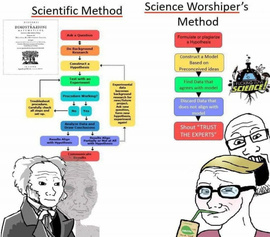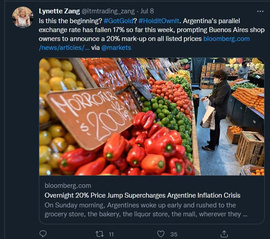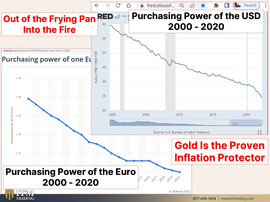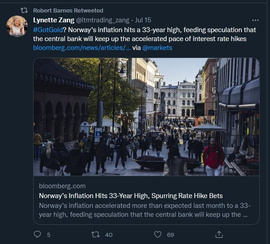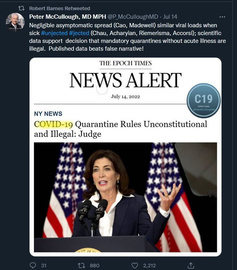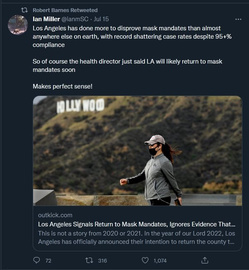Be part of the movement!
Welcome to the community for those who value free speech, evidence and civil discourse.Create your free account
3 comments
Feel free to reply to any comment by clicking the "Reply" button.SCIENCE WORSHIPERS METHOD: Those who say, "Follow the science," cannot seem to get the science about anything quite right. Fauci, for example, is talking about masks again and vaccinations as a way of managing a virus that cannot be stopped by masks and now completely eludes the vaccines alleged protection. In fact, I recently read that those who have recovered from the virus, vaccinated or not, may be reinfected after twenty-eight days. Consequently, these people who virtue signal their respect for science seem, in reality, to have their heads placed in a position that requires their bellybuttons be replaced by a window so that they can have some idea where they are walking. When you hear them bark their marching orders, it is very difficult to take them seriously.
Yeah.
TRUST THE SCIENCE is a legacy of the communists, is it not?
Marx and Engels claimed that, scientifically, socialism was the only way history could end. They called this theory "scientific" socialism and considered it much more sound than the idealistic dreams of the utopians. Engels, after Marx's death, hinted that their theories may need modification, given that socialism had yet to ensue.
After Vladimir Lenin came to control Russia in 1917, his version of Marxism became known as Marxism–Leninism. He altered many of Marx's ideas to rationalize his seizure of power and the atrocities committed by his Bolshevik party. He justified the ends by the means and was willing to do anything to force socialism onto tsarist Russia.
....................................................................................
The Ideas of Marx and Engels
The body of theory espoused by Marx and Engels later came to be called dialectical materialism. Marx first announced his doctrines in The Communist Manifesto, published in 1848. Later, he continued to work out his theories in Das Kapital.
Marxism was presented as a science of revolution. Rejecting earlier thinkers as merely “utopian socialists” whose plans were not based on material realities, Marx’s doctrine was to be a scientific socialism. Marxism brought together many contemporary concerns, including evolution, science, and mass politics. It drew on French politics, English economics, and German philosophy as a comprehensive response to the age.
Marx’s doctrine was based on historical (or dialectical) materialism, seeing human reality as economic at its base. Ideas were merely superstructure built on top of the base, and ideas reflected economic interests, even if people were unaware of this. Thus, there could be no just law as such, but only a legal system protecting the interests of the ruling class. Art, morality, and ideas were the same.
Marxism offered something different and, so it claimed, scientific: It presented a tableau of human history, a dramatic narrative of progress, with starring roles played by the toiling masses and economic forces like industry. Individuals, by contrast, played a lesser role. However, Marx and Engels worked in a disclaimer. With themselves in mind, they stated that certain exceptional individuals could rise above their class origins to survey and influence the historical process as a whole.
Mankind had reached the penultimate stage of history: capitalism. A new working class (the proletariat) confronted the owning class (the bourgeoisie). The term proletarian Marx used is derived from the classical Latin term proles—that is, “offspring.” In ancient Rome, those who did not own property were listed in censuses as having only offspring, proles, so they were proletarians. In Marx’s usage, proletarians had nothing to sell but their labor, and thus they were the lowest class in society.
Relentless competition and low wages meant that the proletariat was constantly growing. The bourgeoisie became smaller, with once-prosperous people dropping down into the proletariat. Over time, inevitably, the proletariat’s growing misery would drive it to revolution. This was a process variously called pauperization, immiseration, or in German, verelendung. When the upheaval inevitably came, this would be a final revolution made for all humanity, as the proletariat class was universal.
It is important to note who were not full-fledged members of this idealized group. Marx looked down on those he called the lumpenproletariat. Lumpen in German means “rags,” so this harsh term refers to the ragged poor, unemployed, criminals, bohemians, and dropouts. These were not the saviors he had in mind. Additionally, Marx saw peasant farmers as a fading class.
Marx and Engels opened their Communist Manifesto with the ringing declaration: “A specter is haunting Europe—the specter of communism.” Their movement was already an irresistible force, they claimed, and they called for working men across the globe to unite.
After an international workers’ revolution, the end of history would ensue. This evocative concept did not mean that all time would cease, but that rather the logic of history had reached its necessary endpoint, with all great ideological struggles finally resolved. The state was to wither away, leaving a classless society free of private property, in which equal individuals would find fulfillment in work. The transition stage, as perfection approached, would be socialism, which then would give way to full, perfect communism.
- The Rise of Communism From Marx to Lenin by Vejas Gabriel Liulevicius
....................................................................................
Ideologies
There are no generally accepted definitions for many of the most important terms, and their associated concepts, employed in studied social science discourse. Most terms are very loosely defined—but sufficiently understood to allow a reasonably effortless exchange of ideas among the initiated. Thus, there are no generally accepted definitions for the terms “religion,” “political,” “democracy,” or “totalitarianism.” Nonetheless, we are perfectly comfortable speaking of “religion” as “that system of beliefs, together with those attendant rules and observances, dealing with things considered sacred.” We speak of the “political” as any arrangement dealing with “the authoritative allocation of resources.”
Certainly, such definitions leave a great deal to be desired. They are not sufficiently precise to rule out things seemingly, but not quite, the same. Such disabilities attend any effort at lexical definition of contested concepts. For present purposes, the intuitive sense of what “religion” or “politics” might mean is perfectly suitable. Much the same will be true of terms like “totalitarian” and “ideology.” Their discursive treatment should make their meaning sufficiently transparent to support discussion.
Notwithstanding, some special attention here will be accorded “ideology”—to serve heuristic purpose in the discussion that follows. “Ideology,” as a concept, will be forced to bear the weight of a number of distinctions important for any discussion concerning the relationship of religion to politics—when neither religion nor politics can be explicitly defined.
In social science exchanges, the term “ideology” is generally understood to refer to special formulations that, in their totality, are neither exclusively scientific nor religious. At the same time, it is held that ideologies may host elements of both. Unlike scientific products, and more like those of religion, ideologies entertain and advance moral judgments, recommendations, enjoinments, and imperatives. Unlike exclusively religious ideologies, secular ideologies make seemingly substantive scientific claims critical to their enterprise.6
As used here, the concept “ideology” covers all those theoretical formulations that pretend to explain the essence and workings of the world and the humans in it. Ideologies are variable in content and intent, but all imagine themselves delivering illuminating, and convincing, “perspectives on the world (Weltanschauungen).” Thus, we are accustomed to speaking of “religious,” “Marxist,” “racist,” and “democratic” worldviews—and assume that each provides some comprehension of the world and its purposes different from any alternative. For any ideology to perform such tasks, it must contain at least three constituent claim components: empirical, logical, and normative. It must, in effect, share at least some of the major attributes of science.
Science is understood to deal with empirical claims—descriptive and predictive propositions about material “reality.” In principle, we expect such claims to be subject to confirmation or disconfirmation by sensory evidence—simple and/or compound observations. In standard science, complex empirical propositions are threaded together by logical connectives and transformation rules in order to predict and explain events and features in the observable world. Of the logical connectives employed by science, it can be said the logic employed proceeds through valid forms to sound conclusion by virtue of explicit definition and rules of transformation. In part, scientific truth becomes a function of language itself. Mathematical truth claims fall into this category. One knows what constitutes a proof in mathematics, and validity in logic. Science has learned to map logicomathematics over the perceived world in order to render predictions possible.
It is intuitively clear that ideologies are both something less, and something more, than empirical and logical truth claims. While composed, in part, of empirical and logical claims, nothing in past history suggests that the falsification of any or all such claims would necessarily result in the renunciation of an ideology.
It is its normative character that clearly distinguishes ideology from science and establishes its affinities with religion. Normative pronouncements tender qualitative judgments—making attributions, for example, of goodness and beauty to things, behaviors, and experiences. Such pronouncements make claims for which no generally accepted truth conditions are available. In general, one simply does not know what evidence would provide the requisite warrant for the claim that a work is “beautiful,” or a behavior “righteous.” Unlike empirical and logical claims, such declamations are typified by emotive, imperative, and perlocutionary affect.7 What they lack is empirical or logical license. It can be said that while ideologies, like science, make efforts to describe and explain the world, their principal function is to inspire transformative behavior—to prompt action. Their principal purpose is not to understand the world, it is to change it.
Ideologies, in effect, are very complicated artifacts. Curiously enough, those committed to one or another ideology spend surprisingly little time attempting to confirm or disconfirm its empirical claims. It would seem, for example, that by the twenty-first century Marx’s followers would have established the empirical truth of the nineteenth-century claim that the “proletariat” has suffered “increasing emiseration” over time. And yet, no unequivocal confirmation has been forthcoming.
In attempting to establish the truth of such a claim, for example, one is not certain who might count as a “proletarian.” Nor is one equipped with a precise definition of what “emiseration” might imply, or how it might be measured. Given the vagueness and ambiguity, it is, in principle, impossible to confirm or disconfirm the truth of the Marxist insistence that the proletariat suffers increasing emiseration over time. None of that, in any way, seems to discourage Marxism’s proponents.
The survivability of such formulations does not seem to depend on the logical or descriptive truth of its claims, but on normative affect. Ideologies are persuasive in ways other than logic and science are convincing.
Most founders of ideologies spend remarkably little time in trying to establish the truth of the empirical and logical components of their belief systems. National Socialist claims concerning the superiority and/or inferiority of one or another “race” defy confirmation. To pretend to establish the truth of such claims minimally requires a generally accepted definition of “race”—and some suggestion as to how “superiority” or “inferiority” might be recognized and measured. The failure to satisfy any of those requirements did little to diminish commitment by the followers of Adolf Hitler.
In fact, it has been the case that the proponents of one or another ideology will make every effort to avoid and/or obstruct attempts to determine the truth or falsity of any of its component claims. Some, for example, will specifically reject the standard procedures of confirmation or disconfirmation. There will be talk of a rejection of “bourgeois” or “Jewish” logic and science. Only the findings of “proletarian” or “Aryan” investigators could possibly be accommodated. Truth and untruth become hostage to methodological eccentricities.
In effect, it would appear that the formulation of empirical or logical truths is not the principal occupation of the ideologist. More than anything else, it seems that ideologies are formulations specifically designed to give expression to evaluative judgments—to prescribe and proscribe, to celebrate heroes and to deliver us from “monsters.” Ideologies frame goal cultures for multitudes. They advance supportive and sustaining codes of conduct. At their best, “secular” ideologies are functional surrogates for traditional religion. Some ideologies appear as secular surrogates for religion because their advocates insist that the bulk of their constituent claims are empirical and/or logical. The majority of theological claims, on the other hand, are acknowledged to be “transcendental,” intrinsically beyond the range of either empirical or logical evidence. Religious beliefs appeal to faith. Secular ideologists claim to be involved in an entirely different venture. They pretend to formulate and advance claims they hold “scientific.”
Some have argued that the secular ideologies of our time, at least in part, are the result of the overall decline in faith, abandonment of belief in a world transcendent. With the commencement of the modern era there was a gradual, then increasingly accelerated, loss of faith in a supermundane reality. The Renaissance, the Enlightenment, and the advance of empirical science all contributed to the process. By the end of the eighteenth century, there were many who dismissed religious beliefs as superstition. At the same time, there were others who insisted that human beings could not be mobilized to collective purpose without appeals religious in character. What they proceeded to do was to put together belief systems that might serve in just such a capacity.
By the time of the French revolution, there were those who fabricated the requisite belief systems—which today are identified as “political religions.” A political religion is a system of beliefs that rejects the notion that political power emanates from a divine source. Instead, a nation or its citizens are “sacralized” and made the repository of sovereign political power. Among later ideologists, there were those who were to recognize other sacralized bases of power: the state, a class, a race, or history itself.
The most familiar of these modern ideologies insist on the absolute quality of the truths they dispense. Throughout the twentieth century, Marxists, Fascists, National Socialists, Maoists, and the followers of Pol Pot have all behaved very much as though possessed of revealed truth. They have behaved, in fact, as though they were communicants of a faith. They rarely, if ever, conceded difficulties in establishing the truth of their most fundamental claims; they poorly tolerated open inquiry; they dealt with any reservations concerning the truth of their claims as moral infractions; and they regularly treated those who attempted to reduce the vagueness and ambiguity of their pronouncements as heretics and apostates. In effect, some of the major ideologists of the modern era have taken on the behavioral properties of the faithful—and the systems they construct, the institutional features of religious intolerance.
That there are no warranted sciences of metaphysics, universal ethics, or applied morality, is critical to present concerns. Throughout history, one of the most important functions of religion has been to explain the ultimate origin and goal of created beings—and thereby to specifically provide codes of conduct, the grounds for moral judgment, the identification of infractions, the depiction of public purposes, as well as the prescription of individual and collective ends. When a subset of political ideologies expressly assumes such metaphysical and normative responsibilities, it can be spoken of as a “political religion.”
It is important to recognize that some ideologies, however they characterize themselves, are essentially religious in character. They have assumed responsibilities that historically have been those of organized faith. Such ideologies, as a subset, pretend to the responsibilities of faith while, at the same time, concealing their expressly normative professions beneath the cover of economic, historical, biological, or philosophical “science.” In traditional religion, enjoinments, injunctions, prescriptions, and proscriptions are warranted by appeal to sacred texts, revelations, epiphanies, and divinations. They are generally conceived binding because of the deep sentiments they inspire. However they choose to present themselves, political religions share many of the same features.
In many ways, traditional and political religions share properties. However disguised as exclusively empirical or logical, for example, political, like traditional, religions recommend, advocate, prescribe, and command behaviors. The agents in such systems almost always inspire awe, and the leaders, reverence. The systems strategically employ sign, symbol, and ritual—and the “truth” of doctrine rests on individual and collective faith. In both traditional as well as political religions, it is faith, not empirical or logical truth, which inspires loyalty, self-abnegation, commitment, and obedience.10
- Totalitarianism and Political Religion An Intellectual History, 2012 by A. James Gregor....................................................................................
Lenin was educated and articulate, but: “We are all susceptible to the pull of viral ideas. Like mass hysteria. Or a tune that gets into your head that you keep humming all day until you spread it to someone else. Jokes. Urban legends. Crackpot religions. Marxism. No matter how smart we get, there is always this deep irrational part that makes us potential hosts for self-replicating information.” ― Neal Stephenson, Snow Crash
“In a country where the sole employer is the State, opposition means death by slow starvation. The old principle: who does not work shall not eat, has been replaced by a new one: who does not obey shall not eat.” ― Leon Trotsky
“The difference between communism and socialism is that under socialism central planning ends with a gun in your face, whereas under communism central planning begins with a gun in your face.” ― Kevin D. Williamson, The Politically Incorrect Guide to Socialism
“Communism is the final logic of the dehumanization of man.”
― Fulton J. Sheen
....................................................................................
"Although there were important differences between . . . totalitarian regimes, they drew from a common well of enthusiasm, and shared such heretical goals (or rather temptations) as fashioning “new men” or establishing heaven on earth. They metabolised the religious instinct." —Michael Burleigh
“Marxism is supposed to be a social science designed to see through hypocrisies and denial, but Marxism ended up as a kind of earplug, guaranteed to deafen its disciples.” ― Paul Berman
“The influence that Marxism has achieved, far from being the result or proof of its scientific character, is almost entirely due to its prophetic, fantastic, and irrational elements. Marxism is a doctrine of blind confidence that a paradise of universal satisfaction is awaiting us just around the corner. Almost all the prophecies of Marx and his followers have already proved to be false, but this does not disturb the spiritual certainty of the faithful, any more than it did in the case of chiliastic sects.… In this sense Marxism performs the function of a religion, and its efficacy is of a religious character. But it is a caricature and a bogus form of religion, since it presents its temporal eschatology as a scientific system, which religious mythologies do not purport to be.” ― Leszek Kołakowski
“Marxism was a simple substitute for Christianity. Replace God with Marx, Satan with the bourgeoisie, Heaven with a classless society, the Church with the Party,” ― Arundhati Roy, The God of Small Things
“It is quite true that Marx said that religion is the opium of the people. But of course we now know that Marxism is the crack cocaine of the people.” ― Douglas Wilson
“In Christianity this evolution lasted centuries; in Bolshevism — only decades. If Lenin was the St. Paul of Marxism, who set out to transplant the movement from its original environment into new lands, Stalin was already its Constantine the Great. He was, to be sure, not the first Emperor to embrace Marxism, but the first Marxist revolutionary to become the autocratic ruler of a vast empire.” ― Isaac Deutscher, Russia After Stalin
“Interestingly, Marxism, Communism and its derivative, Socialism, when seen years later in practice, are nothing but state-capitalism and rule by a privileged minority, exercising despotic and total control over a majority which is left with virtually no property or legal rights.” ― Andrew Carrington Hitchcock, The Synagogue Of Satan - Updated, Expanded, And Uncensored
“Therein lies the true essence of Marxism. ‘From each according to his ability, to each according to his needs’ only ever works with a gun in your hand." ― Philip Kerr, Prussian Blue
“Marxism is not necessarily what Karl Marx wrote in Das Kapital, also called Capital. A Critique of Political Economy, but whatever it is that all the warring sects believe, who claim to be the faithful. From the gospels you cannot deduce the history of Christianity, nor from the Constitution the political history of America. It is Das Kapital as conceived, the gospels as preached and the preachment as understood, the Constitution as interpreted and administered, to which you have to go.” ― Walter Lippmann, Public Opinion
“Hence a communist society would have a new ethical basis. It has been claimed – by Lenin among others – that Marxism is a scientific system, free from any ethical judgements or postulates. These are the essential points of ‘the first Marxism’. It is manifestly not a scientific enterprise in the sense in which we understand science today. Its theories are not derived from detailed factual studies, or subjected to controlled tests or observations.” ― Anonymous
"That Marxism is not a science is entirely clear to intelligent people in the Soviet Union. One would even feel awkward to refer to it as a science. Leaving aside the exact sciences, such as physics, mathematics, and the natural sciences, even the social sciences can predict an event—when, in what way and how an event might occur. Communism has never made any such forecasts. It has never said where, when, and precisely what is going to happen. Nothing but declamations. Rhetoric to the effect that the world proletariat will overthrow the world bourgeoisie and the most happy and radiant society will then arise.” ― Alexander Solzhenitsyn, Warning to the West
“Kirk defined the ideologue as one who “thinks of politics as a revolutionary instrument for transforming society and even transforming human nature.” Unleashed during the most radical phase of the French Revolution, the spirit of ideology has metastasized over the past two centuries, wreaking horrors. Jacobinism, Anarchism, Marxism, Leninism, Fascism, Stalinism, Nazism, Maoism—all shared the fatal attraction to “political messianism”; all were “inverted religions.” Each of these ideologies preached a dogmatic approach to politics, economics, and culture. Each in its own way endeavored “to substitute secular goals and doctrines for religious goals and doctrines.” Thus did the ideologue promise “salvation in this world, hotly declaring that there exists no other realm of being.” ― Russell Kirk, The American Cause
A striking feature of Marx’s writing is his hostility to Christianity and religion. For example, in the preface to his ‘Critique of Hegel’s Philosophy of Right’ (1843) Marx wrote:
"‘Religion is the sigh of the oppressed creature, the heart of a heartless world … It is the opium of the people. The abolition of religion as the illusory happiness of the people is the demand for their real happiness. To call on them to give up their illusions about their condition is to call on them to give up a condition that requires illusions’."
Although Marxism has failed as a political and economic system, ironically it flourishes as a secular religion. Perhaps Marxism ought to be regarded as the crack cocaine of the Left.
“The appeal by twentieth-century pluralists to scientific method was also ideologically—and even messianically—driven. It ignored scientific data that interfered with environmentalist assumptions and misrepresented socialist faith as “scientific planning.” ― Paul Edward Gottfried
....................................................................................
Communism and Terminology
The term communism only became common in the 1840s. Even after that, the word communist—in the sense of emphasizing community and common control—was applied to other kinds of social projects, like experimental communities or communes.
An Evolving Tradition
Communism featured both continuity and change. Additionally, once in power, communist regimes revealed internal contradictions, which stressed their systems. When it comes to communism, five contradictions in particular are notable.
1 - The first has to do with the role of the individual in history. Marx presented a powerful vision of history being made by masses of people. By contrast, individuals played less of a role. However, with communism, it is the case that decisive leaders loom up again and again, starting with Marx himself.
2 - The second contradiction involved geography. Although communism was meant to be global, Marx expected it to evolve first in the most industrially advanced countries. Thus, in the imagination of communists, the real prize was Germany—a leading industrial power. However, against expectations, communism’s greatest influence came in less developed countries, beginning with Lenin’s rise to power in Russia.
3 - A third problem was that communism never entirely settled its relationship to nationalism. Predating communism, nationalism as an ideology was another powerful model of community and an idea about belonging. Marx deplored nationalism; however, communist regimes tried to co-opt nationalist sentiment to use it to reinforce their power. This saw mixed and sometimes contradictory results.
4 - A fourth contradiction was the way in which the communist project turned into a tradition, even when it promised radical breaks with the past. Communism became a tradition full of historical echoes, venerable precedents, time-honored rituals, and original texts that held nearly sacred status.
5 - Finally, a fifth contradiction appeared that had everything to do with commitment to communism as a faith. While it promised scientific certainty and discarded religious dogma, communism also drew on and mobilized faith or even fanaticism. This occurred to the point that many observers have called communism a political religion.
- The Rise of Communism From Marx to Lenin by Vejas Gabriel Liulevicius
Non-profit NGOs are just money laundering schemes for the lawmakers and authorized contract signing staff. #KickOutTheKickback
Social justice "science" is one of the plagues of our time.
The problem is that all science is implicated by this
scientists are human after all and need funding and have a basic need for recognition.
In most countries fundamental science is funded by governments.
So science and the scientific method is comprised.
@Hanno I agree, and add to that the corporate "scientists" whose job it is to help maximize profits over scientific rigor. And when the corporations and the government agencies are bed-mates, the the science is doubly compromised.
Recent Visitors 21
Photos 11,798 More
Posted by JohnHoukAI Dystopia Moving from Sci-Fi to a WEF NWO: A Look at Stop World Control Documentary, ‘THE END OF HUMANITY - As Planned By The Global Leaders’ SUMMARY: An intro by Patricia Harrity followed ...
Posted by JohnHoukGlobalist Tyranny Videos Batch – Part TWO SUMMARY: The video list I’m sharing leans more toward Globalist Tyranny (which includes the American traitors – the Dem-Marxists) in this batch.
Posted by JohnHoukGlobalist Tyranny Videos Batch – Part ONE SUMMARY: I’ve spent the last few days looking at saved videos largely from Telegram Social Media.
Posted by JohnHoukWATCH OUT FOR AN AI TYRANNY & NSA Spying SUMMARY: I’ve witnessed too many dark-side leaps and bounds to give credence to AI-Tyranny naysayers.
Posted by Sensrhim4hizvewzCohencidence or PLANNED???
Posted by Sensrhim4hizvewz Hopefully, everyone catches it and everyone gets better
Posted by JohnHoukFBI Investigates Baltimore Bridge Collapse! Suggests NOT an Accident! SUMMARY: On 3/27/24 I shared a Lara Logan Tweet on her opinion of what caused the Francis Scott Key Bridge near Baltimore ship ...
Posted by JohnHoukPolitical Tyranny – Part Two Videos Showing the Political Tyranny of Factionalism & Globalist Entanglements SUMMARY: IN Part 1 I used President Washington’s 1796 Farewell Address as a ...
Posted by JohnHoukPolitical Tyranny – Part One President Washington Warned of the Insidious Outcome of Political Factions & Foreign Entanglements SUMMARY: George Washington – RIGHTLY SO – is called the Father...
Posted by JohnHoukFuellmich Political Persecution Encapsulates Globalist Lawfare SUMMARY: A few thoughts on Deep State Political Persecution of Trump & Supports.
Posted by JohnHoukLooking at Birx Not Fauci Managed Medical Tyranny Includes Personal Observations on Legit President Trump SUMMARY: Looking at a VNN examination of the short Documentary: “It Wasn't Fauci: How ...
Posted by FocusOn1Uh oh, i hate to say this, but israel was formed in 1948, 100 years after karl marx wrote his book. Was it formed as a atheist communist country?
Posted by MosheBenIssacWith woke fat ass acceptance, only applies to women (fat bitches). What used to be funny is now illegal. The video won a Grammy Award for Best Concept Music Video in 1988 [youtu.be]
Posted by JohnHoukRemember WHY You Are Resisting the Coup Summary: Well… It’s series of videos time again.
Posted by JohnHoukA Call for Intercession Over WHO Power Grab Treaty SUMMARY: A call for prayer on America’s leaders related to the National Sovereignty terminating Pandemic (better known as Plandemic) Treaty.
Posted by MosheBenIssacDisney COLLAPSES Billions Lost In MINUTES After Shareholders Troll Company Sticking With WOKE! [youtu.be]
